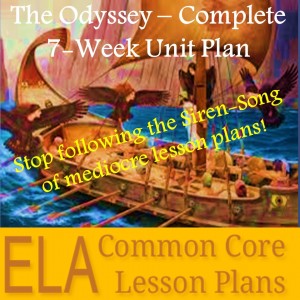
I’ve been teaching Homer’s epic for more than a decade. That’s anywhere from 3-6 periods per day. After doing a little math, I calculated that I’ve read/taught The Odyssey around 36 times.
(Note: when I say “read it” in this context, I mean read the excerpts contained in just about every 9th grade anthology. I have read the entire epic 3 times in addition to reading the excerpts I teach 36 times).
Why am I telling you this? Credibility.
I have compiled a gazillion lesson plans for The Odyssey. Some work. Some don’t. This one works.
And since we’re on the subject of credibility, that’s what the theme of today’s lesson is. It’s the start of The Odyssey research skills section, which you can read about in its entirety if you follow the link.
The discussion on day one of the research involves establishing credibility by compiling a list of experts on a particular topic. This compilation of experts we call a works cited page. Here’s today’s expert:
Jago, Carol, “What Elements Will You Find in Epics and Myths?” Elements of Literature: Third Course. Austin, TX: Holt, Reinhart, and Winston. 2009. 2009. 1012-7. Print.
The first thing students do is write the citation on the top of their Cornell Notes Template.
Then they take notes. Two important research skills taken care of on day one, skills that will be repeated.
I would provide a copy of the article, but those pesky copyright laws prevent it. But if you teach English, chances are there’s a similar article in your literature book.
Common Core Standards
W.9-10.7 Conduct short as well as more sustained research projects to answer a question (including a self-generated question) or solve a problem; narrow or broaden the inquiry when appropriate; synthesize multiple sources on the subject, demonstrating understanding of the subject under investigation.
W.9-10.8 Gather relevant information from multiple authoritative print and digital sources, using advanced searches effectively; assess the usefulness of each source in answering the research question; integrate information into the text selectively to maintain the flow of ideas, avoiding plagiarism and following a standard format for citation.
Share This:
Speak Your Mind